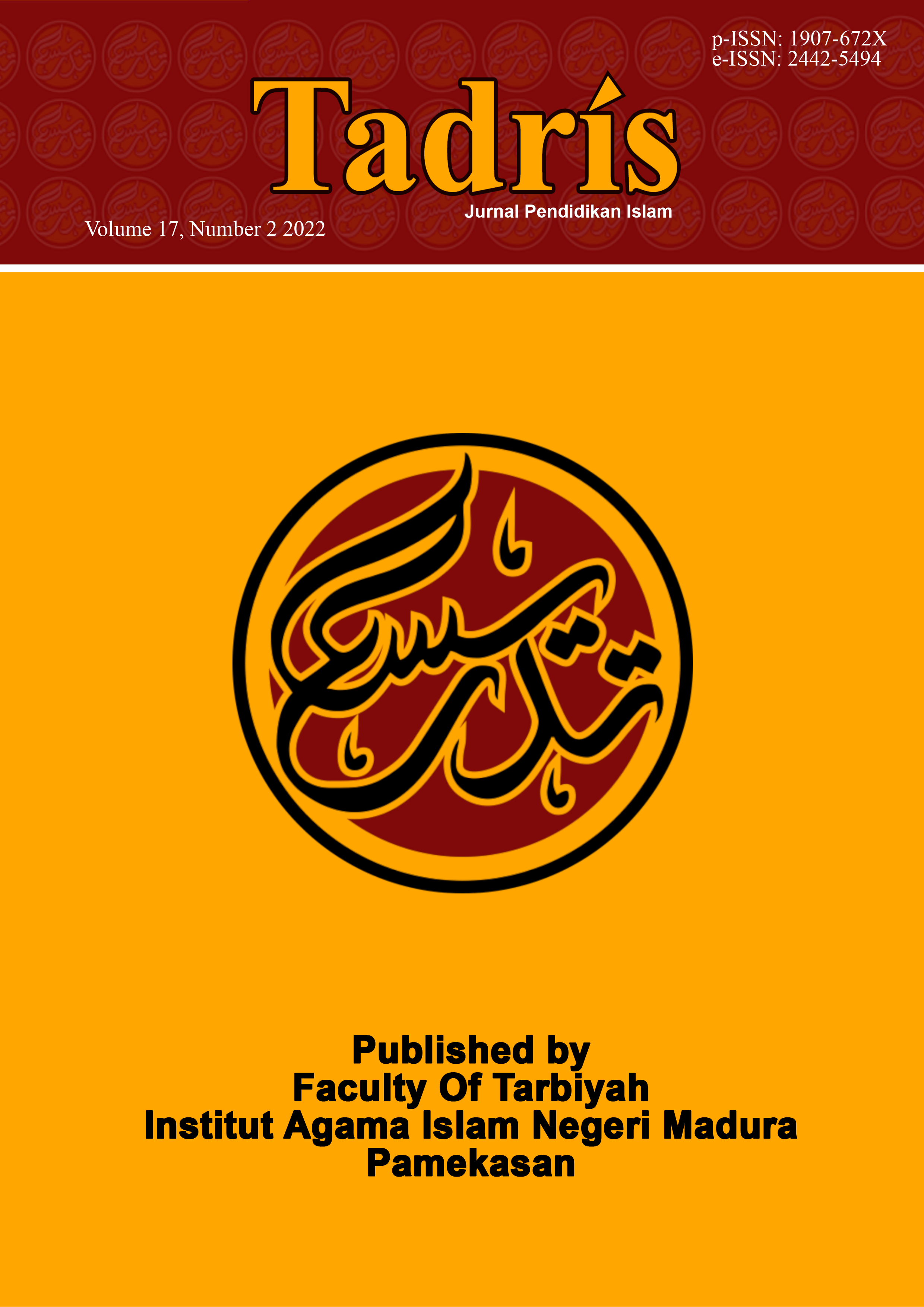Integration of Islamic Science and Science in Schools: Studies on Learning Islamic Religious Education in the Digital Era
 Abstract views: 373
,
Abstract views: 373
,
 PDF downloads: 323
PDF downloads: 323
Abstract
The purpose of this study is to determine the integration of Islamic science and general education in schools and find out its implementation factually. This research uses qualitative methods with descriptive types of research and approaches using literature studies. Data sources and collection are carried out using literature relevant to the research, such as national and international books or journals. The results showed that the integration of Islamic science and science is more suitable for schools under the auspices of religion, such as madrasahs, Islamic boarding schools, and schools with integrated Islamic information. The implementation of the integration of Islamic science and science in schools, namely the change in applicable learning methods, requires the involvement of parents and the equation of vision and mission, as well as an integrative model curriculum.
Downloads
References
Akbarizan. Integrasi Ilmu. Pekanbaru: Suska Press, 2014.
Akbarizan, M. “Integrasi Ilmu: Perbandingan Antara UIN Suska Riau Dan Universitas Ummu Al Quran Makkah (MA Almaktsur, Ed.).” Suska Press, 2014.
Chanifudin, Chanifudin, and Tuti Nuriyati. “Integrasi Sains Dan Islam Dalam Pembelajaran.” Asatiza 1, no. 2 (2020): 212–29.
Fiteriani, Ida. “Analisis Model Integrasi Ilmu Dan Agama Dalam Pelaksanaan Pendidikan Di Sekolah Dasar Islam Bandar Lampung.” TERAMPIL: Jurnal Pendidikan Dan Pembelajaran Dasar 1, no. 2 (2014): 150–79.
Hakim, D. S. L Al. “Integrasi Ilmu Dalam Pendidikan.” Ta’dibi: Jurnal Manajemen Pendidikan Islam, no. Vol 6 No 12 (2018): 104–23.
Hakim, Dosen STAI Luqman Al. “Integrasi Ilmu Dalam Pendidikan,” n.d.
Halik, Abdul. “Paradigm of Islamic Education in the Future: The Integration of Islamic Boarding School and Favorite School.” Information Management and Business Review 8, no. 4 (2016): 24–32.
Idris, Saifullah, and Fuad Ramly. “Dimensi Filsafat Ilmu Dalam Diskursus Integrasi Ilmu.” Yogyakarta: Darussalam Publishing, 2016.
Kemenag, R I. “Al-Quran Dan Terjemahan.” Jakarta: PT. Sygma Examedia Arkanleema, 2010.
Mansir, Firman. “Aktualisasi Pendidikan Agama Dan Sains Dalam Character Building Peserta Didik Di Sekolah Dan Madrasah.” J-PAI: Jurnal Pendidikan Agama Islam 7, no. 2 (2021).
———. “Analisis Model-Model Pembelajaran Fikih Yang Aktual Dalam Merespons Isu Sosial Di Sekolah Dan Madrasah.” Ta’dibuna: Jurnal Pendidikan Islam 10, no. 1 (2021): 88–99.
———. “Implications of Teacher Certification on Professionalism and Welfare of 21th Century PAI Teachers.” Tadrib 5, no. 2 (2019): 138–52.
———. “Interconnection of Religious Education and Modern Science in Islamic Religious Learning.” EDUKASI: Jurnal Pendidikan Islam (e-Journal) 9, no. 2 (2021): 229–37.
———. “The Urgency of Fiqh Siyasah In Islamic Education Learning At Madrasas And Schools.” POTENSIA: Jurnal Kependidikan Islam 6, no. 2 (2020): 142–54.
Mansir, Firman, Halim Purnomo, and Tumin Tumin. “Penerapan Pembelajaran Pendidikan Agama Islam Berbasis Sains Budaya Lokal Di Sekolah Dan Madrasah.” TARBAWY : Indonesian Journal of Islamic Education 7, no. 1 (2020): 70–79. https://doi.org/10.17509/t.v7i1.23478.
Mansir, Firman, Brawijaya Street, Kasihan District, and Daerah Istimewa Yogyakarta. “The Response of Islamic Education To The Advancement of Science In The Covid-19 Pandemic Era In The Islamic Boarding Schools” 8, no. 1 (2021): 20–27.
Mansir, Firman, and Syarnubi Syarnubi. “Guidance And Counseling: The Integration Of Religion And Science In 21st Century For Character Building.” At-Tarbiyat: Jurnal Pendidikan Islam 4, no. 2 (2021).
Mansir, Firrman. “The Problematic and Challenge of Fiqh Learning in School and Madrasah in the Covid-19 Pandemic Era.” MUDARRISA: Jurnal Kajian Pendidikan Islam 12, no. 2 (2020): 169–84.
Muspiroh, Novianti. “Integrasi Nilai-Nilai Islam Dalam Pembelajaran IPA Di Sekolah.” Jurnal Pendidikan Islam, 2013.
———. “Integrasi Nilai Islam Dalam Pembelajaran IPA (Perspektif Pendidikan Islam).” Jurnal Pendidikan Islam 28, no. 3 (2013): 484–98.
Purwaningrum, Septiana. “Elaborasi Ayat-Ayat Sains Dalam Al-Quran: Langkah Menuju Integrasi Agama Dan Sains Dalam Pendidikan.” Inovatif: Jurnal Penelitian Pendidikan, Agama, Dan Kebudayaan 1, no. 1 (2015): 124–41.
Rosli, Mohd Aiman Shazlishah, Mohd Hafiez Abd Hamid, and Bushrah Basiron. “Integrasi Pendidikan Antara Islam Serta Sains Dan Teknologi.” Kertas kerja Dibentangkan di Seminar Tamadun Islam, 2018.
Rusdiana, Ahmad. “Integrasi Pendidikan Agama Islam Dengan Sains Dan Teknologi.” Istek 8, no. 2 (2014): 123–43.
Sulaiman, M. “Integrasi Agama Islam Dan Ilmu Sains Dalam Pembelajaran.” Jurnal Studi Islam: Pancawahana 15, no. 1 (2020): 96–110.
Suparjo, Suparjo, Moh Hanif, and Dimas Indiana Senja. “Developing Islamic Science Based Integrated Teaching Materials for Islamic Religious Education in Islamic High Schools.” Pegem Journal of Education and Instruction 11, no. 4 (2021): 282–89.
Tan, Charlene. “Educative Tradition and Islamic Schools in Indonesia,” 2014.
Wibisono, M Yusuf. “Definisi Agama Di Indonesia: Sebuah Dilema Agama Pribumi.” Modul Sosialisasi Toleransi Beragama 65 (2020).
Yaacob, Solehah Bt. “The Concept of an Integrated Islamic Curriculum and Its Implications for Contemporary Islamic Schools,” 2018.
Copyright (c) 2022 TADRIS: Jurnal Pendidikan Islam

This work is licensed under a Creative Commons Attribution-NonCommercial 4.0 International License.
The journal operates an Open Access policy under a Creative Commons Non-Commercial 4.0 International license. Authors who publish with this journal agree to the following terms:
- Authors retain copyright and grant the journal right of first publication with the work simultaneously licensed under a
 Commons Attribution-NonCommercial 4.0 International License
Commons Attribution-NonCommercial 4.0 International Licensethat allows others to share — copy and redistribute the material in any medium or format, and adapt — remix, transform, and build upon the material.
- Authors are able to enter into separate, additional contractual arrangements for the non-exclusive distribution of the journal's published version of the work (e.g., post it to an institutional repository or publish it in a book), with an acknowledgement of its initial publication in this journal.
- Authors are permitted and encouraged to post their work online (e.g., in institutional repositories or on their website) prior to and during the submission process, as it can lead to productive exchanges, as well as earlier and greater citation of published work (see The Effect of Open Access).














